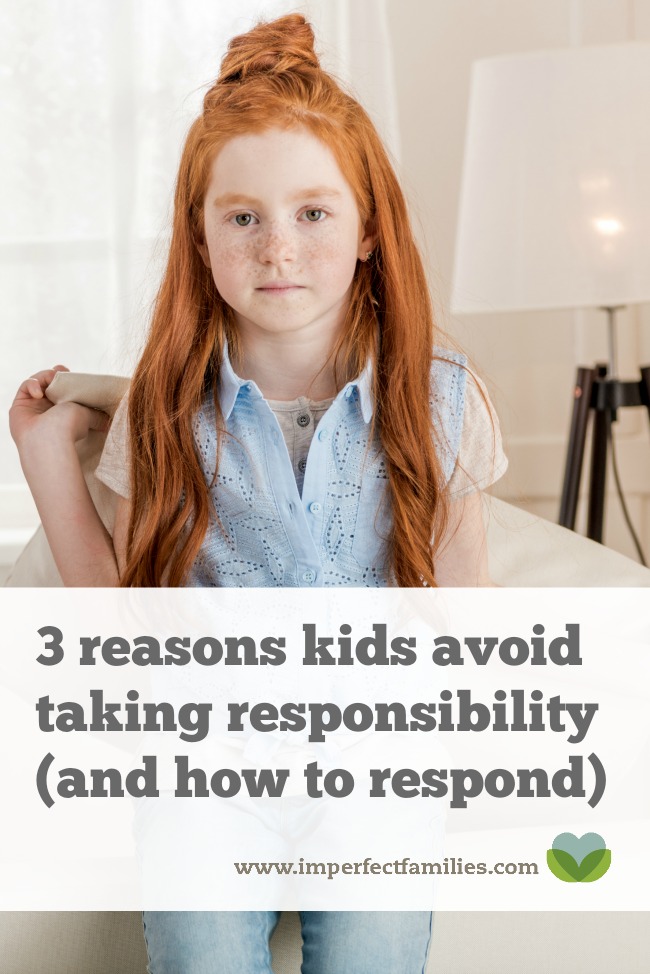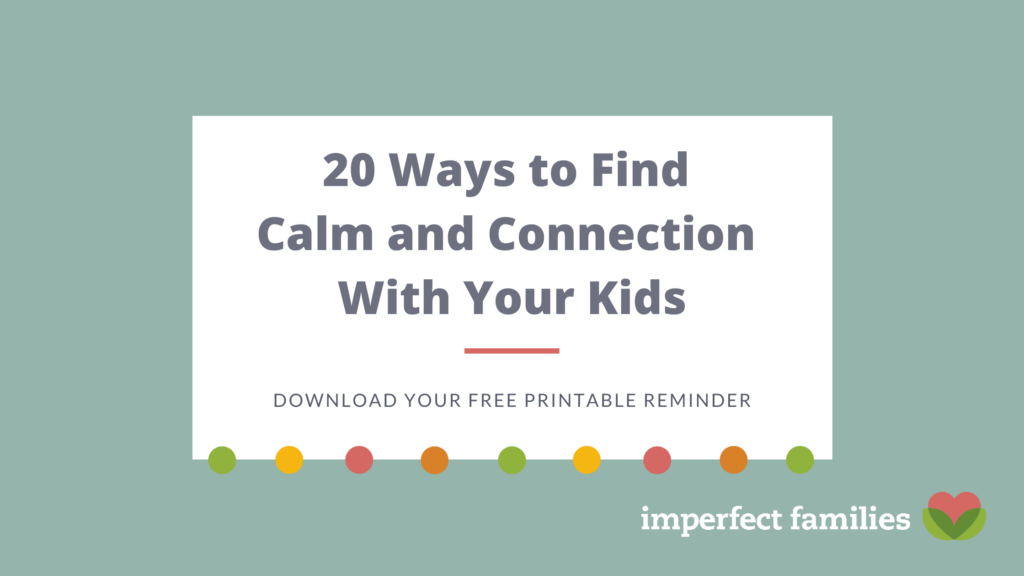You’d like your kids to admit their faults and be honest about their mistakes, but all they do is shift the blame and point the finger at other people. Learn three reasons why children avoid taking responsibility and how to teach your kids to be responsible for their actions.

An affiliate link is included in this post. If you purchase through this link, I receive a small commission at no additional cost to you.
The house rattles from the intensity of their screams.
By the time you enter the room, the argument is out of control.
Opening a can of worms, you ask, “What’s going on!?”
“He started it!”
“No, he did!”
“Did not!”
“Did too!”
This conversation is going nowhere. “One at a time…can you tell me what happened?”
“Well…he wouldn’t stop…”
“Me!? No way, YOU wouldn’t stop…”
The finger-pointing continues. No one admits fault. No one talks about their part in the struggle.
Why can’t they just admit it!?
“Mom, he’s right. I didn’t stop when he asked me to. My anger got the best of me and I didn’t think through the consequences of my actions. I’m sorry.”
There. Is that so hard?
How to encourage your kids to be responsible for their actions
Before we can teach kids to take responsibility for their actions, we have to understand the “why” behind their behavior. Your child’s avoidant behavior has a purpose.
And no, it’s not just to annoy you or to get their brother in trouble.
Here are 3 reasons your child avoids taking responsibility, shifts the blame, and lies about their behavior.
1. Self-preservation
Let’s be honest, admitting a mistake is difficult. There’s a lot of risk involved – will there be a consequence? How harsh will the consequence be? How will this impact my relationship with so-and-so? Sometimes, it seems easier to avoid the issue completely than to admit any fault.
What you can do:
- Respond, don’t react. Take a deep breath between your child’s behavior and your response. Rather than overreacting, forcing them to apologize, or take responsibility immediately, give everyone time to calm down.
- Make it safe to come forward with honesty. If/when your child does take responsibility, skip the lectures and resist the urge to pile on the punishments. Instead, acknowledge how hard it can be to admit fault and talk about how to address the challenge differently next time.
- Be curious. If your child is making the same mistake over and over, or if they seem to be struggling in one particular area, it may be a sign that they need help working through this situation differently – maybe they need to learn how to communicate a need, problem-solve with a friend, or manage a big feeling. Look for ways to help your child gain these skills, rather than hoping they figure it out someday.
2. Shame
Shame is a powerful motivator, it sends the message, “You better hide before someone discovers that you are woefully flawed and therefore, unlovable.” Hearing this message loud and clear, kids retreat inward, believing if they can avoid the topic, no one will know the truth about their imperfection.
What you can do:
- Make it safe to come forward. Being vulnerable is scary, but you can ease this discomfort by watching your responses. Overreacting and punishing behavior will trigger your child’s urge to hide again. Instead, take a deep breath and thank them for being honest.
- Emphasize that they are loved. Shame cannot reside where there is unconditional acceptance and love. More than anything else, let your child know that nothing they do will change how much you love them, just the way they are.
- Talk about the action, not the person. Rather than talking about your child’s “flaws” focus on the behaviors, empathize with their struggle, and problem solve, “Everyone forgets their library book sometimes, what would help you remember it next week?”
The connection between shame and blaming others is explained in more detail in this video from Brene Brown.
3. Externalization
Sometimes, feelings are too much for your child to handle. Rather than owning the feeling, accepting empathy or support, they hand it over to you – and then act as if it doesn’t bother them or that it never existed. Unfortunately, as parents, we are left with the emotional burden and the intense feeling that something needs to be done about it…Immediately!
What you can do:
- Recognize that you’re holding the emotion now. Most of the time, parents don’t realize that they’ve been given the emotional burden until later. (You find yourself up in the middle of the night trying to figure out how to help your child raise their math grade or solve that friendship drama and your child seems completely unphased by it.)
- Take a deep breath. Holding your child’s emotions when they are too big to handle is a generous part of parenting. But, it doesn’t mean you have to let it run your life. Before you snap into action, pause. Admit your struggle to a trusted friend who is outside the situation or give it a day or two before talking about it with your child.
- Stop trying to solve the problem. Unless serious safety concerns exist, the best action is no action. Lisa Damour explains it this way: “Given the opportunity to unload their discomfort, most teens will gather their resources and work through what went wrong or discover, with the benefit of time, that the problem comes down to size on its own.” Untangled, Pg 96
Understanding that your child’s “avoidant” behavior has a purpose, will help you respond in a way that is positive, respectful, and encourages growth and maturity.
But, of course, learning to take responsibility for your actions takes time.
While it would be ideal if your kids happily admitted their faults immediately…this probably isn’t a realistic goal.
Be patient.
Allow mistakes to be learning opportunities, rather than shameful experiences that need to be avoided at all cost.
And eventually, you’ll see (and hear) your child “own” their behavior – even when it’s hard – rather than shifting the blame to someone else.
Want to learn more?
If there’s some serious lack-of-responsibility-taking going on in your house, it may be hard to address it on your own. Sometimes it takes an outside perspective to help you see the patterns of behavior and make some changes. Online Parent Coaching is designed to help you parent with confidence – even when things are overwhelming or chaotic! Learn more about Online Parent Coaching and schedule your first appointment today!



Comments have been turned off to retain the privacy of all families. If you have a question or comment on the topic, you're always welcome to contact me.